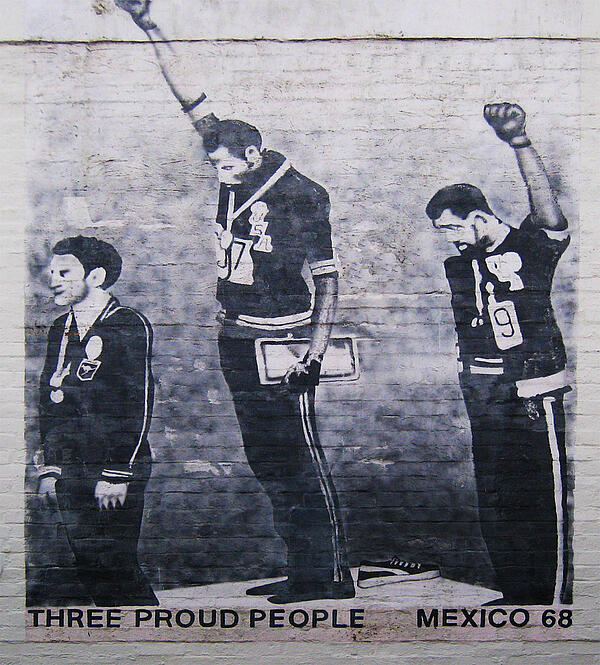Peter Norman
Australian athlete Peter Norman, a white man, famously displayed solidarity with Tommie Smith and John Carlos, two athletes remembered for their black power salute at the 1968 Mexico Olympic Games. Peter Norman, then a 26-year-old athlete was later reprimanded by the Australian athletics authority for wearing a badge in support of Smith and Carlos’ civil rights cause.
Smith had won the 200 metre race, Norman had come second, and Carlos third. As the three prepared to collect their medals, Norman noticed that Smith and Carlos had adjusted their clothing. Smith had taken off his trainers and was waiting in black socks. Carlos had unzipped his jacket and was wearing a black bead necklace. The pair explained that they were symbolic of the African American’s history in the United States. Bare socks represented poverty; the beads symbolised the lynching of innocent people and the unzipped jacket was in solidarity with all blue-collar workers in America.
Norman had a track record of supporting civil rights - he opposed his government’s ‘White Australia’ policy. Wanting to support his fellow athletes, he asked if he could wear an ‘Olympic Project for Human Rights’ badge. Both Smith and Carlos also wore the badge. Norman also suggested that both men wear one black glove each. This would later become the focus of one of the most iconic photographs in modern history.

Few noticed that Peter Norman, who won silver at the 200 metres, was wearing a badge for Olympic Project for Human Rights (OPHR).
Smith and Carlos were sent home from Mexico and largely criticised by the US sporting establishment. Norman was also subject to criticism. After the ceremony, Norman’s badge was closely examined by the Australian authorities in Mexico. Once they realised what it was, they deemed him guilty of making a political statement at an apolitical event. Although the Australian media vilified Norman for his ‘unpatriotic’ part in the protest, he was allowed to stay in Mexico for the rest of the Games.
Norman only received a reprimand from the Australian athletics authority, despite pressure from the media. He continued to train as an athlete and competed in the trials for the 1972 Munich Olympics.
Although Norman was ranked fifth in the world’s sprinting rants and proved he was one of the fastest sprinters in Australia, he was not chosen to represent his nation at the Olympics. He retired from athletics after this and took up football.
Smith and Carlos’ contribution to the Civil Rights Movement was finally recognised in 1996, when they were invited to the Atlanta Olympics.
Peter Norman’s act of solidarity was later acknowledged at the 2000 Sydney Olympics, when he was invited to meet the US track squad. World record holder Michael Johnson told Norman, “you are my hero”.
When Peter Norman died of a heart attack in 2006, Tommy Smith and John Carlos were among the men who carried his coffin. In his eulogy, Smith commended Norman for being “a man of solid beliefs, a humanitarian”. John Carlos simply said: “Peter Norman was my brother.”
In 2012, the Australian Parliament released an apology for the treatment of Norman since the event in 1968. As well as posthumously recognising Norman’s underappreciated athletic achievements, it apologised for failing to send him to the 1972 Munich Olympics, despite repeatedly qualifying.
See also: Mexico 1968
MLA Citation/Reference
"Peter Norman". HistoryLearning.com. 2026. Web.
Key facts
| Name: | Peter Norman |
| Birth Date: | 12 June 1942 |
| Death: | 3 October |
| Position: | Australian track athlete |
| Known for: | wearing a badge in solidarity with Tommie Smith and John Carlos at the 1968 Mexico Olympic Games. |
